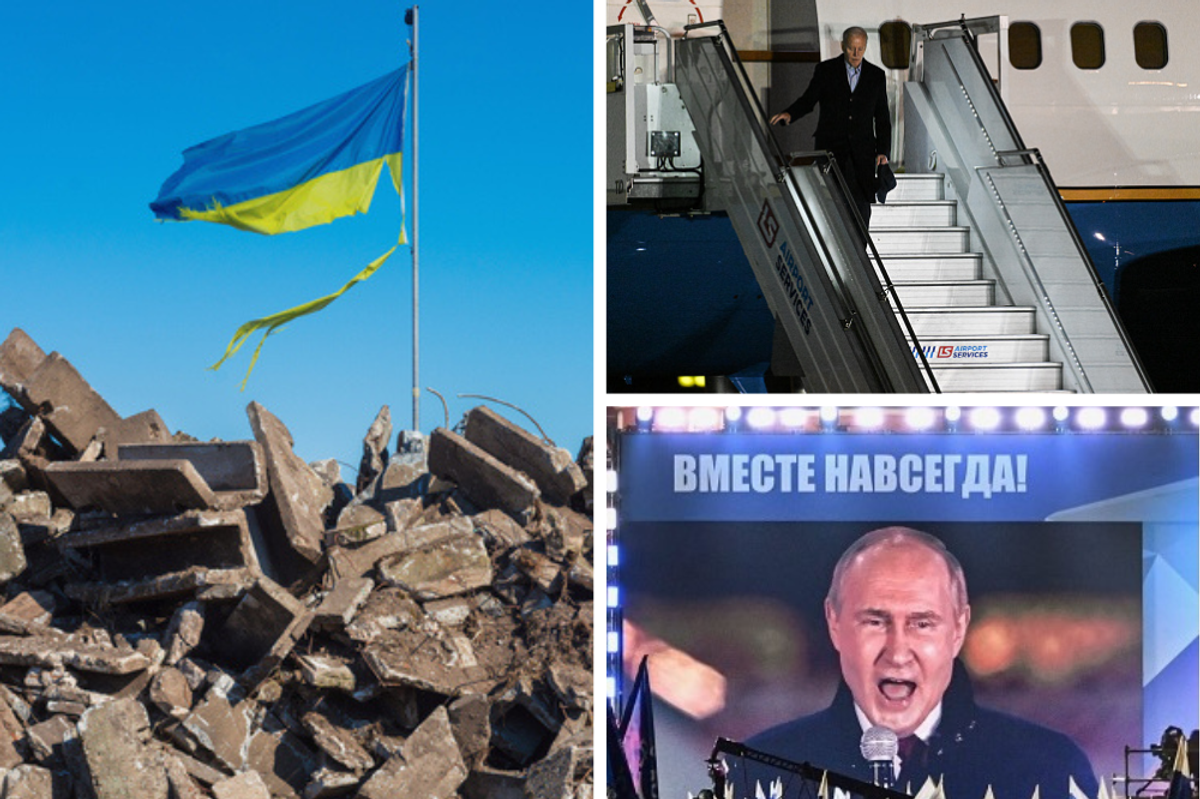The two Trumps were on display Wednesday talking about foreign policy and national security.
Neither made much sense.
One spoke with a teleprompter before a noontime audience in a Washington, D.C. hotel ballroom; the other, without a teleprompter, answered questions at an evening, Fox-televised town hall in Indianapolis, Indiana.
One was chained to a script, the other unshackled and free to say whatever came to mind, and he did.
Neither Trump showed he had any sense of history or that such things as treaties carry over from one administration to another.
Ballroom Trump said, in reference to NATO allies, that “the countries we are defending must pay the costs of this defense, and if not, the U.S. must be prepared to let these countries defend themselves. We have no choice.” He pointed out that “only 4 of 28 other member nations, besides America, are spending the minimum required two percent of GDP on defense.”
First of all, the two percent of GDP is a “goal” or “target” and not a requirement to join or remain a member of NATO.
Of course Article 5 of the NATO Treaty binds its members together, committing them to protect each other, meaning that an attack against one member is considered an attack against all members.
It has no clause saying, if you are not a paid up member the others will not honor their commitment to mutual defense. Perhaps Trump looks at joining a defense alliance the way he looks at joining one’s golf club, where if you don’t pay your dues or bills you get thrown out.
Town Hall Trump, playing to an audience, took the NATO critique a step further.
Speaking of those laggard paying countries he said, “We have trillions, probably, trillions of dollars out there of past due. And I said I want these countries to pay up and we'll protect them and we'll take care. I mean we're protecting them. They're not doing anything for us. They've got to pay up. And I said not only do they pay up, they have to pay us all of the past arrears.”
Ballroom Trump promised to call for “a summit with our NATO allies…not only [to] discuss a rebalancing of financial commitments, but [to] take a fresh look at how we can adopt new strategies for tackling our common challenges…including migration and Islamic terrorism.”
Is he planning to renegotiate the NATO Treaty to make it a requirement that each nation put two percent of its GDP into defense? And will he change the mutual defense section to eliminate those nations that don’t? And what’s this about “paying us” for their arrears? Will Trump walk the U.S. out of NATO if he doesn’t get his way?
The highlight of his several inconsistencies came when Ballroom Trump immediately followed his threat to the U.S. NATO allies by saying, “Our friends are beginning to think they can’t depend on us.”
This from a man who Wednesday and earlier made a major point about saying, “We must as a nation be more unpredictable,” and then complained, “We tell everything. We’re sending troops. We tell them. We’re sending something else. We have a news conference. We have to be unpredictable.”
He made that statement in the context of not wanting to describe what his secret plan is for “very quickly” destroying the Islamic State. The U.S. is not alone in fighting the Islamic State. We have various allies around the world. So will he be unpredictable with them about his plan?
Ballroom Trump referred to Barack Obama as “a president who dislikes our friends and bows to our enemies, something we’ve never seen before in the history of our country.”
But his candidacy has already drawn open opposition and concern from American allies and, not surprisingly, popularity in Russia. He truly is a presidential candidate like something we’ve never seen before in the history of our country.
Take his consideration of the Iran deal, which Ballroom Trump called “disastrous,” adding that since “we watched them ignore its terms even before the ink was dry.”
“Remember Iran cannot be allowed to have a nuclear weapon,” he repeated.
He should coordinate with Town Hall Trump who said hours later, in the wake of the U.S. going into Iraq, “now Iran is taking over the Middle East. And it’s terrible. I mean, if we didn’t do anything in the last 15 years, if we forgot the Middle East was there, we would be in such great shape today by comparison.”
Of course invading Iraq was not the only thing being done. The U.S., hesitatingly under George W. Bush and more aggressively under President Obama, forced Iran into negotiations to halt its development of a nuclear weapon.
What’s the two-Trumps’ plan to prevent Iran from getting a nuclear weapon? Or does he want to be unpredictable about that too?
There is much more to look for from Trump, who Sen. Bob Corker (R-Tenn.), chairman of the Senate Foreign Relations Committee, described as “someone who's evolving. You know that, as candidates, you're drinking through the fire hose and you're learning as you move along.”
Town Hall Trump also gave out his own bit of history.
He told the Indianapolis audience, “when I was growing up, the United States always used to win. And it was a long time ago. We haven't been winning so much. But we certainly aren't winning now in any capacity.”
Trump was born June 14, 1946, nine months after the end of World War II, the last war the U.S. “won.”
When he was growing up there was the Korean War, which ended as a stalemate and the Vietnam War, which was a defeat, and in which Trump avoided serving thanks to four student draft deferments and a medical deferment.
Chained to a teleprompter or unshackled before his supporters, it’s going to be a challenge for the media, his opponents, and most of all the voters as to which Trump is talking at any one time, and what the real Trump is thinking.













